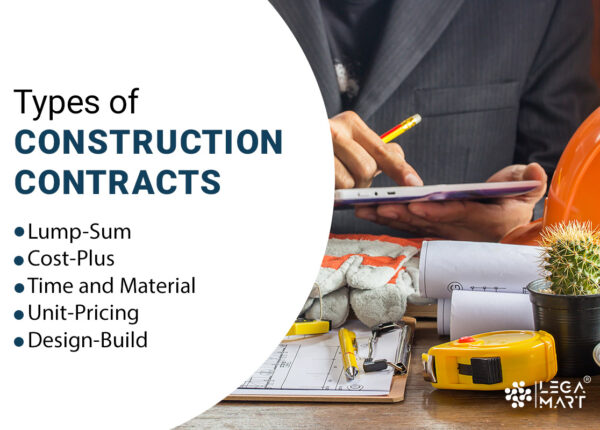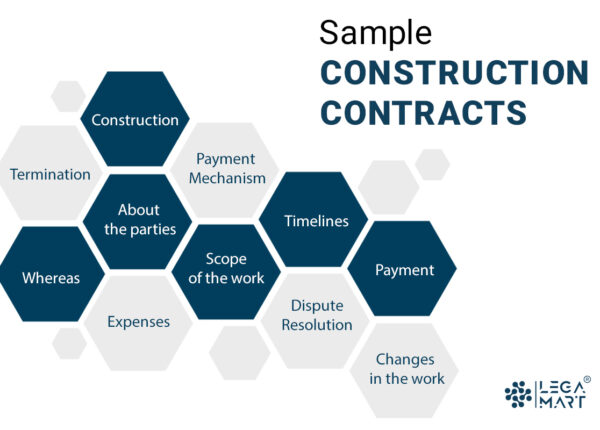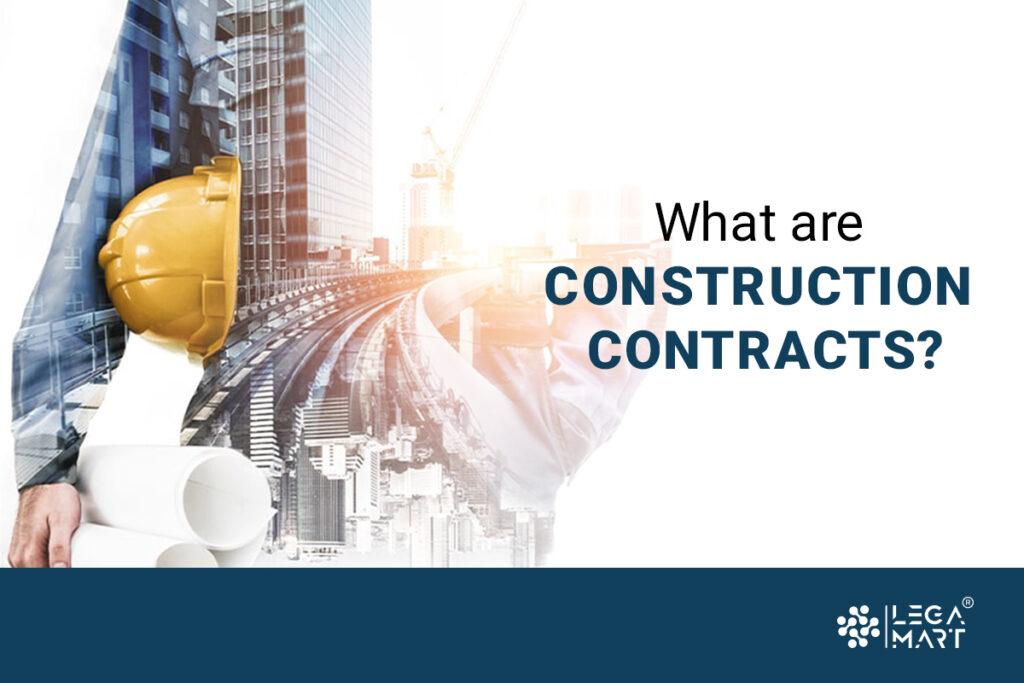Imagine yourself in a situation where you hire a contractor to construct a building for you, and he denies it later on. What action will you take in case there is no binding contract? How will you ensure the completion of the project of your construction operations? In the realm of Legal Practice & Specialization, this highlights the need for a construction contract where you can stipulate all the details of the construction project. That will bring more confidence between the parties to the contract. You need to draft the construction contract agreement by including relevant terms and clauses in accordance with the construction law.
What is a Construction Contract?
A construction contract is an agreement between the contractor and the person/company hiring the contractor to complete the construction work. It is a type of new engineering contract in the construction industry. It covers all the essential contract terms and conditions between the parties. In addition, it sets out the scope and terms of the construction project undertaken by the contractor.
It is usually a legally binding agreement providing dispute resolution methods between the parties. Different dealers have different sets of requirements for the construction project. For instance, one dealer may provide the advance payment while another may provide the payment after completion. In a way, it can be said that there is no one-size-fits approach to drafting the construction contract agreement.
What are the Types of Construction Projects?
Though there can be many types of construction projects, these are the four major types:
Commercial Construction Project
These are the construction projects for the building with a commercial purpose. Office buildings and restaurants are the perfect examples. The contractor mostly engages in minor works building contracts in such projects.
Residential Construction Project
These are the construction projects for building homes or apartment buildings where people can reside. People usually search for design contractors who enter into the design-build contract.
Infrastructure Construction Projects
These are civil construction projects. The most common and easy-to-remember construction projects include roads, bridges, highways, and airports.
Industrial Construction Projects
These are comparatively more complex and large construction projects. For instance, building warehouses, oil refineries, and large manufacturing plants require skilled and experienced contractors and sub-contractors.
Types of Construction Contracts

The construction contract is not the same in all dealings. In addition, there are different types of construction contracts, depending upon the needs, requirements, and expectations of both parties.
Parties set the contract terms according to the type of contract they are entering into.
There are different types of construction contracts, as follows:
Lump-Sum Contract
These contracts are also called fixed-price contracts, meaning the total price for the entire job. Such contracts are more owner-friendly as the prices remain the same throughout the contract performance, even when some changes are made.
Cost-Plus Contracts
These contracts are used in uncertain situations. The ‘Plus’ denotes a predetermined fee, or the percentage agreed to, including the maximum guaranteed price. These contracts avoid the possibility of conflicts and ensure the contractor by guaranteeing the minimum price.
Time and Material Contracts
These contracts are also used in uncertain situations. Project owners assure the contractor of the contract payment by paying hourly or daily without any predetermined fixed payment. In other words, contractors charge hourly or daily based on the time and materials invested and used in the project.
Unit-Pricing Contract
These contracts provide the details of prices as per the units. The owner and contractor agree to payment based on units, including materials, supplies, and labor, and the rates are fixed according to that. Owners benefit themselves by mitigating future losses by unforeseen future inflation.
Design-Build Contract
These design build contracts help owners to benefit themselves by the combination of design and construction project delivery into one single contract. The contract differs from the traditional ones, where project owners receive construction designs during the bids. In these contracts, construction begins before the final design is completed.
What’s included in a Construction Contract?
There are no straight-jacket rules to decide what is included and what is not. Instead, it depends on the requirements and expectations of both parties.
A construction contract document includes a detailed scope of the project. Parties need to ensure that nothing is missed out. All the minute details have to be included, like the scope of the project, contract drawings, the details of the sub-contractor, timelines and specifications, consideration amount, payment mechanism, collateral warranties, dispute resolution mechanism, jurisdiction, consequences of breach, and other relevant details.
It is not usually necessary for the contractor himself to complete the project. The contractor may hire other sub-contractors to complete the project, which will involve the execution of another written contract. A general contractor must ensure that he hires another sub-contractor by entering into a construction contract. The general contractor will be responsible for the other contract terms, and he can not transfer his obligations to the project manager or the project owner unless there are other terms to the contrary.
JCT contract in the united kingdom
In the United Kingdom, a construction contract is also called a JCT contract, a standard building contract used in the construction industry. JCT contract, used in short form, means the joint contracts tribunal and is the popular form of a construction project in the united kingdom. The JCT contract produces a standard form of contract, known as a standard building contract, with collateral warranties. These contracts have a provision of dispute resolution as arbitration or adjudication.
Construction Contract Clauses
There are not any specified terms and clauses for a construction project. It depends on the requirements of both parties. Construction contracts follow a standard form in all cases, with flexibility in the clauses of the contract. The clauses also depend on the type of construction project. For instance, a contractor in a large industrial construction project may find it more convenient to include an escalation clause where he will save himself from a future contingency that may or may not happen.
Construction contract clauses may seem easy to draft, but a person with less knowledge and expertise in contract law and contract documents may miss out on important clauses, thereby increasing the chances of future disputes between the parties. Such contracts need proper drafting and reviewing, incorporating all the details of the construction process. You need not worry about your draft.
We at Legamart have experienced lawyers and attorneys from all over the world. Explore our stars now through the Legamart directory. You can get your construction contract drafted and reviewed by them at your convenience.
These are the most important construction contract clauses which must be taken into consideration while drafting and reviewing the contract document:
Scope of Work
The general meaning of the scope of work is the area where the work to be performed is described. This clause describes the work providing all the details of its scope. This needs to be drafted with all due care and attention as it is the main part of the construction contract agreement.
Consideration
This clause will provide the details of the consideration amount between both parties in the construction operations. The consideration for the project owner is the completion of the construction work, and for the general contractor is the contract amount or the payment for the work done. Any ambiguity in the clause will lead to serious disputes leading to more expenditure for both parties.
Parties need to negotiate between themselves for the construction cost, which is decided according to the project’s complexity.
Project Timelines
A project owner wants to ensure the timely completion of the project. He is usually reluctant to longer timelines in small projects. The hiring party may also provide the commencement date of the project. This acts as a measure to check the timelines in case the construction act starts later than the starting date; the owner may presume the delay in the completion. In such circumstances, he may plan for future contingencies in a better manner and take the collateral warranties from the contractor.
The project owner may also provide a clause for the conditions to extend the time. Usually, extension is not allowed in all situations. The project owner sets out the conditions for extending the timelines.
Terms of the Payment
A construction contract includes a payment terms clause specifying the contract price and the construction cost. There may be different terms in different contracts. For example, one project may provide for the payment after completion, whereas another project may provide for the progress payment or the advanced payment, or the lump sum payment, depending upon the suitability of the parties.
In case of payments, other than payment after completion, proper records have to be maintained as to the payment date and payment method.
Dispute Resolution
Construction contract administration or contract management has the most common method of dispute resolution in case of construction disputes. The disputes are usually resolved through negotiation, mediation, conciliation, and arbitration. Such methods keep the parties on the safe side.
Parties may also provide for litigation and adjudication as another dispute resolution mechanism for construction disputes. The litigation method is far more time-consuming, costly, complex, and challenging. Such contractual disputes need not be dragged into the courts and negotiation, and arbitration methods should be used for dispute resolution.
Attachments
Construction contracts are usually complex. All the details are not included in the contract itself, and at the same time, parties ensure that nothing is left out. Parties add attachments with the contract documents where blueprints and other specifications are provided for the project.
Breach of Contract and its consequences
The parties may also provide for the conditions of breach of the contract. The situation arises when the contractor/sub-contractor, as the case may be, does not complete the construction contract per the agreed-upon terms. The contract may also provide for the consequences of the breach thereof. The consequences may be termination of the contract or specific performance of the contract with bearing costs for the delay in completion. For more helpful articles as such, go and search on our website.
Sample Construction Contract

Construction Contract
This Construction Contract (the “Contract”) is between (name of the project owner) and (name of contractor) and is entered on ______ (the date of the contract).
Table of contents
[To be inserted according to the contents]
About the parties
Project owner: _______ (name) resides at ______ (residential address), and the mailing address is _____ (the address where mail is received).
Contractor: ______ (name) resides at ______ (residential address), and the mailing address is _____ (the address where mail is received).
The project owner and the contractor are hereinafter jointly referred to as the “Parties” and individually as the “Party.”
WHEREAS
The parties, through this contract, have entered into legally binding terms for the construction of the project by the contractor for the project owner.
NOW, THEREFORE, in consideration of the terms and conditions herein contained and other valuable consideration, the Parties hereby agree as follows:
Scope of the work
The contractor, through this contract, undertakes to complete the construction work on or before ____ (provide the last date) according to the scope of work attached to this agreement as the contract documents.
Timelines
The contractor undertakes to complete the project within ____ (specify the months/years), failing which the contractor will be bound by the decisions of the owner of the project. The commencement date of the project is ____ (mention the starting date), and the last date for completion is ____ (mention the last date).
The construction work will be continued from 9:00 AM-6:00 PM, and any failure will make the contractor liable.
Payment
The project owner agrees to pay the amount of _____ (specify the amount) in consideration of the services performed by the contractor. All the payments will be made in cash only, which will be recorded in the accounts of the owner of the project.
Payment Mechanism
The project owner agrees to follow the payment mechanism as _____ (specify when the payment will be made: either after completion or progress payments or advanced payment, or a lump sum payment).
Expenses
All the actual costs incurred in the completion of the project will be borne by the contractor himself, and the total amount of payment to the contractor will include such expense and the actual cost amount in it.
Dispute Resolution
The parties submit themselves to the arbitration proceedings in case any dispute arises between them. No dispute will take the matter to court, and only the arbitral tribunal has the sole jurisdiction to decide.
Changes in the work
The parties may, by mutual agreement, make any change in the scope, time, and nature of the work by a written agreement to that effect. Any such change will have the effect of nullifying the previous terms on that subject.
Termination
The project owner may terminate the contract by giving a 15-day notice if the contractor is not carrying out the construction operations agreed upon. The contractor may also terminate the contract by giving a 15-day notice if the owner is not making timely payments to the contractor as agreed.
IN WITNESS WHEREOF, the Parties have entered into this agreement which will form part of the written contract.
[Project owner] [Client/Customer]
____________ _____________
Name: Name: [_]
Conclusion
A construction contract, as already noted, is the contract between the owner of a project and a contractor. There is not any rigid rule that the contractor himself has to complete the project unless and until there are conditions in the contract to the contrary. The contractor can hire sub-contractors to complete the project.
Parties have to come into a mutually legally binding written construction contract to enforce their rights more legally. Such contracts need a proper draft and review, as anything repugnant to the context may change the nature and terms of the contract.




